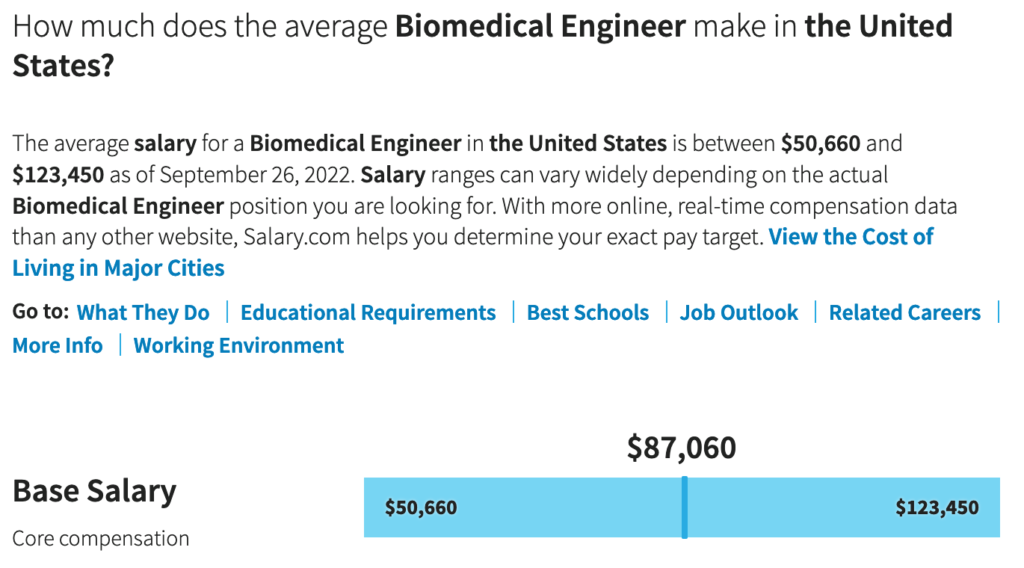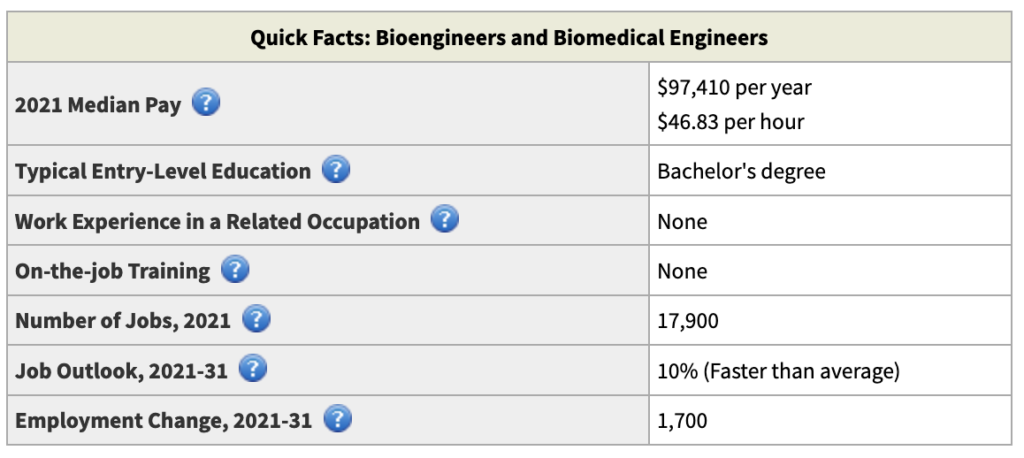If you’re in Biomedical Engineering or planning on getting into Biomedical Engineering, it’s important that you read through these Biomedical Engineering Statistics so you can make the best educated choices for yourself.
We cover the applications of Biomedical Engineering, the outlook, compensation, and tons of good Biomedical Engineering Statistics.
February 29, 2024What is Biomedical Engineering?
Biomedical Engineering consists of using Engineering principles to solve customer problems regarding biology and medicine.
What are some applications of Biomedical Engineering?
Applications of biomedical engineering involve the design of medical equipment such as prosthetics, surgical equipment, heart rate monitors, anything healthcare related.
Common examples of Biomedical Engineering products are:
- Pacemakers
- X-Ray Equipment
- CT Scanning Equipment
- EKG Monitors
- Wheelchairs
- Prosthetics
- Thermometers
- Blood Pressure Monitors
- Glucose Meters
- Insulin Pumps
- Defibrillators
- Microscopes
- Surgical Equipment – Tables & Chairs
How do you become a biomedical Engineer?
To become a Biomedical Engineer, you’re going to have to go to a 4-year university to obtain a STEM degree.
A bachelor’s in STEM will be good enough for you to get an entry level job in Biomedical Engineering.
What are the best Biomedical Engineering Companies to work for?
The top Biomedical Engineering companies that have a dominant presence in the market are:
- Phillips Healthcare
- Siemens
- Johnson and Johnson
- Medtronic
- Applied Medical
- GE Healthcare
These companies are all very established in the marketplace regarding pharmaceutical and biomedical applications.
Biomedical Engineering Demographic Breakdown
By Employment
- Full Time – 73%
- Part Time – 27%
By Gender
- Men – 54%
- Women – 46%
Ethnic Mix
- White – 42%
- South Asian – 13%
- Other – 12%
- East Asian – 9%
- Black – 8%
- Hispanic, Latino, or Spanish – 7%
- Arab – 7%
- Native Hawaiian / Pacific Islander – 1%
Demographic breakdown courtesy of CareerExplorer
What skills do Biomedical Engineers require?
Biomedical Engineering requires competence in the following skillsets:
- CAD
- FEA
- Manufacturing Engineering
- Mechanical Engineering
- Electrical Engineering
- Circuit Design
- Programming
- Rapid Prototyping
- Additive Manufacturing
- Machining Methods of Medical Equipment
How many Biomedical Engineering Students are enrolled in universities?
According to CollegeEvaluator.com, in the academic year of 2020 – 2021, a total of 276,287 students have been enrolled in Biomedical Engineering programs:
- 150,452 undergraduates in Biomedical Engineering
- 125,835 graduate students in Biomedical Engineering
Biomedical Engineering University Interesting Student Statistics
University of Washington at Seattle
University of Washington at Seattle has 48,149 Biomedical Engineering students
Georgia Institute of Technology
Georgia Tech has the largest number of female Biomedical Engineering students at 26,685.
University of California at Berkley has the most online enrollment of 31,349 Biomedical Engineering students that are all online exclusively.
How much do biomedical engineers get paid?
According to Salary.com, the average Biomedical Engineer gets paid $87,060.

According to the Bureau of Labor Statistics, the 2021 median salary for Biomedical Engineers was $97,410 per year.

What is the projected job outlook for biomedical engineers?
The projected job outlook according to the Labor of Bureau Statistics is 10% from 2021-2031.
What do biomedical engineers like about their jobs?
Biomedical Engineering provides challenging and fulfilling work that seeks to help millions in healthcare.
Along with designing equipment that is critical for patient care, Biomedical Engineering products are used by consumers daily.
Designing products that help people who are unable to do daily things such as eating or walking truly provides satisfying work.
What are some biomedical engineering associations to join?
BMES – Biomedical Engineering Society

BMES provides a professional society for students, teachers, researchers, and professionals in the Biomedical Engineering industry.
Number of members – 6800+
Annual events consist of conferences that focus on health related issues and technology pertaining to heart disease, cancer, women’s health, and the condition of health globally.
BioMedEng Association – Association of Biomedical Engineers

BioMedEng is a non-profit organization that focuses on education and knowledge transfer in Biomedical Engineering, Medical Engineering, and BioEngineering. The society has held the annual UK conference for over ten years. Founded in 2008, the organization has held multiple events focused on the advancement of technology led by both those in research and in academics in the Europe region.
AIMBE – American Institute for Medical and Biomedical Engineering

The American Institute for Medical and Biomedical Engineering (AIMBE) is a non-profit Biomedical Engineering organization based in Washington D.C.
The society provides opportunities for those to network about the latest trends and discoveries regarding Biomedical Engineering as a whole.
The organization provides resources for students, teachers, medical professionals, engineers, industry leaders, and more.
What are people’s views on the outlook of the biomedical engineering industry?
Biomedical Engineering is typically not the first engineering discipline on everyone’s list.
Most people seem to get into Biomedical Engineering as a function of these jobs taking those who can’t get into areas they want (such as Defense or Tech)
Biomedical Engineering is not talked about very much outside of the Biomedical Engineering industry.
Because Biomedical Engineering is so niche, you will find people that are very passionate about the emergence of new medical devices that will promote long term human longevity in the future.
If you are in the Biomedical Engineering industry or planning on getting into the industry, you will meet some like-minded individuals who are very passionate and knowledgable about this niche sector.
What concerns do people have with biomedical engineers?
Although the technology in healthcare is rising rapidly and as human longevity is trending to increase, the big “boom” just isn’t there with Biomedical Engineering.
That’s not to say that there is no opportunity within Biomedical Engineering, but we just don’t see it.
Maybe as high precision manufacturing improves, there will be game changing breakthroughs such as artificial organs and the like which has the potential for opportunity there.
Biomedical Engineering Job Statistics Final Thoughts
Biomedical Engineering is typically not everyone’s first choice. At this point, the high salaries are in tech jobs and in companies such as Meta, Apple, Amazon, Netflix, Google, etc. As a result, you’ll generally find those studying in STEM try to break into tech.
As a mechanical engineer, there are opportunities to get into tech companies through positions regarding data centers, hardware, stress analysis, and etc.
Biomedical Engineering is not talked about for a reason – although the potential to do work to increase the longevity of human beings or improve human quality of life, the compensation doesn’t reward them.
It’s very evident in the compensation numbers that Biomedical Engineers get paid less compared to other industries such as Aerospace or Chemical Engineering, which we have recently done Statistics posts on.
About the author

Kazuyoshi Fujimoto, PE
Founder | Engineering Career Coach | Principal Mechanical Engineer
Kazu oversees all of ultmeche’s engineering services. He provides consulting such as resume reviews, rewrites, mock interviews, and all services career related. Additionally, Kazu performs consulting work regarding Oil & Gas, Automotive, and Aerospace & Defense. Kazu is licensed as a professional engineer in the state of California and has 9+ years of experience in Oil & Gas, Automotive, and Aerospace & Defense.
